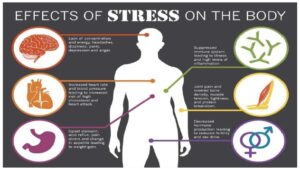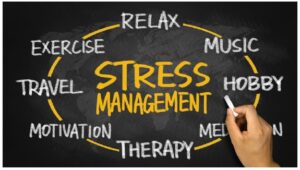THE IMPACT OF STRESS ON PERFORMANCE AND HOW TO MANAGE IT

INTRODUCTION
Stress is a natural and inevitable part of life, and it affects individuals in different ways. Stress is a response to any physical, mental, or emotional challenge or threat. While a certain amount of stress can be beneficial, prolonged and intense stress can have negative effects on an individual’s performance, productivity, and overall well-being.

Throughout my illustrious career in the police department, spanning over 30 years, I have walked the thin blue line and witnessed firsthand the toll that stress can take on both myself and my fellow officers. From holding critical positions in the Government of India and Tamil Nadu, including Chief of Crime Branch CID, Director of Vigilance and Anti-Corruption, Additional Director General of Police, Law and Order, to commanding a massive team of 30,000 as Inspector General in the paramilitary, overseeing the security of 55 critical national installations – I have been at the forefront of high-pressure situations, making critical decisions, and managing teams during times of crisis. But amidst the chaos and challenges, I have learned the art of stress management through the power of bio-hacking.

As a firm believer in leading by example, I have made it my mission to prioritize my well-being and combat stress through various cutting-edge techniques. One of my pillars of stress management is physical fitness. I lace up my running shoes and hit the pavement every day, clocking in at least 10 kilometres. My unwavering dedication to running has even earned me two prestigious entries in the Asian Book of Records for marathon running. The rush of endorphins and the sense of accomplishment that comes with pushing my body to its limits not only helps me stay physically fit but also provides a much-needed release of stress.
But that’s not all – I have delved deep into the world of mindfulness and meditation to further enhance my stress-busting arsenal. I make it a daily practice to meditate using various techniques like mantra meditation and binaural beats for at least half an hour. The stillness and tranquillity that I cultivate during these sessions help me calm my mind, centre my thoughts, and keep stress at bay.
In addition to physical fitness and mindfulness, I have also made significant changes to my nutrition to optimize my stress resilience. Embracing a plant-based diet and moderating my alcohol intake has helped me fuel my body with the nutrients it needs to thrive while avoiding the pitfalls of stress-induced emotional eating or unhealthy habits. I have even dabbled in the ketogenic diet, experimenting with different approaches to find what works best for my body and mind.
As a firm believer in the power of rest and recovery, I also prioritize my sleep. I track my sleep patterns religiously and make sure to get a minimum of 6 to 7 hours of quality sleep each night. This allows me to wake up rejuvenated and ready to tackle the challenges of the day with a clear mind and a well-rested body.
To further support my body’s ability to manage stress, I have incorporated adaptogens like Ashwagandha and Ginseng into my routine. These natural herbs have been proven to help the body adapt to stress and promote overall well-being, providing me with an added layer of resilience in the face of stressors.
Through my unwavering commitment to bio-hacking my way out of stress, I have been able to maintain peak productivity, stay focused, and lead my team with unwavering resolve, even in the most demanding of situations. I firmly believe that these techniques are not limited to my profession or life circumstances – anyone can learn and implement them to effectively manage their stress levels and optimize their performance in any walk of life.
So, whether you are a police officer, a busy professional, or simply someone looking to conquer stress and elevate your performance, I am living proof that biohacking your way out of stress is not only possible but also immensely beneficial. Remember, with the right tools and techniques, you too can conquer stress and emerge.
The fight or flight response is a physiological reaction to stress that evolved as a survival mechanism in primitive times. It allowed individuals to respond to acute stressors, such as a predator, by either fighting or fleeing. However, in modern times, individuals are experiencing prolonged stress from a variety of sources, including work, family, financial concerns, and technology. The prevalence of stress in modern life can have significant negative effects on an individual’s physical and mental health.

One of the most significant contributors to modern-day stress is technology. With the constant connectivity and fast-paced nature of modern life, individuals may feel like they are always “on” and never have a chance to truly disconnect. This can lead to burnout, exhaustion, and an inability to manage stress effectively.
To combat this, individuals need to take intentional breaks from technology and prioritize self-care. This can involve mindfulness practices such as meditation or deep breathing exercises, as well as a physical activity such as exercise or spending time outdoors. Finding ways to disconnect from technology and reduce exposure to stressors can help individuals manage stress and improve overall well-being.
In addition to technology-related stress, individuals may also face financial stress, loneliness, and social media-related stress, among other types of stress. Stress affects the body and impacts it physiologically and psychologically. Let’s take a look at how it impacts.
Physiological Effects of Stress
Stress triggers the release of hormones such as cortisol and adrenaline, which activate the body’s “fight or flight” response. These hormones increase heart rate, blood pressure, and breathing rate, preparing the body to respond to a perceived threat. While this response can be helpful in short bursts, chronic stress can lead to elevated cortisol levels, which can result in numerous negative physiological effects such as headaches, digestive problems, and a weakened immune system.
Psychological Effects of Stress
Stress can also have a significant impact on an individual’s psychological well-being. Chronic stress can lead to impaired attention, decreased memory and cognitive function, and negative emotions such as anxiety and depression. The impact of stress on mental health is a growing concern, with numerous studies linking stress to an increased risk of developing mental health conditions.
Scientific studies have extensively researched the impact of stress on individuals, both physiologically and psychologically. Here are a few key findings:

Increased cortisol levels – Cortisol is a hormone that is released in response to stress. Studies have found that prolonged stress can lead to elevated cortisol levels, which can contribute to a variety of negative health effects, including impaired immune function, weight gain, and cardiovascular disease.
Impaired attention – Chronic stress has been shown to impair attention and cognitive function, making it harder for individuals to focus and concentrate on tasks.
Negative emotions – Stress can also lead to negative emotions, including anxiety, depression, and irritability. These emotions can further exacerbate stress and create a vicious cycle.
Physical health – Chronic stress has been linked to a variety of physical health problems, including high blood pressure, heart disease, and digestive issues.
Mental health – Stress has been linked to a variety of mental health issues, including anxiety, depression, and post-traumatic stress disorder (PTSD).
It’s important to note that not all stress is bad. Short-term stress, known as acute stress, can be beneficial and can help individuals respond to challenges and perform better in certain situations. However, chronic stress is a different story and can have serious negative impacts on both physical and mental health.
Famous personalities, including athletes, actors, and politicians, often face immense pressure and stress. Despite this, they have developed various coping mechanisms to manage stress and optimize their performance. For example, Olympic swimmer Michael Phelps, who won 28 medals, including 23 gold medals, has used visualization techniques to prepare for races and reduce stress. Similarly, actor Emma Stone practices mindfulness meditation to manage stress and anxiety.
Managing Stress to Enhance Performance

Relaxation Techniques
Relaxation techniques such as deep breathing, progressive muscle relaxation, and yoga have been shown to reduce stress and improve overall well-being. These techniques promote relaxation and decrease the physiological and psychological effects of stress. For example, research has shown that regular practice of yoga can reduce stress, anxiety, and depression.
Mindfulness
Mindfulness is a mental state characterized by present-moment awareness and non-judgmental acceptance. Mindfulness-based stress reduction (MBSR) is effective in reducing stress and improving mental health outcomes. Practising mindfulness can enhance performance by increasing attention and focus.
Cognitive-Behavioural Therapy
Cognitive-behavioural therapy (CBT) is a form of talk therapy that helps individuals identify and change negative thought patterns and behaviours. CBT is effective in reducing stress, anxiety, and depression. By changing negative thought patterns, individuals can reduce the psychological effects of stress and enhance their performance.
Resilience and Adaptability
Resilience is the ability to bounce back from adversity and adapt to change. Developing resilience can help individuals manage stress and enhance their performance by promoting positive coping strategies. Adaptability is the ability to adjust to new situations and challenges. By developing adaptability, individuals can better manage stress and maintain their performance in challenging situations.
SOME WAYS OF BIOHACKING STRESS
Biohacking is the practice of using science and technology to optimize physical and mental performance. Here are a few ways you can use biohacking to manage stress and become more productive:

Meditation – Meditation has been shown to reduce stress, increase focus, and improve overall well-being. By incorporating a daily meditation practice into your routine, you can better manage stress and improve productivity.
Exercise – Regular exercise has been shown to reduce stress and anxiety, improve mood, and boost cognitive function. Incorporating exercise into your daily routine can be a powerful tool for reducing stress and improving productivity.
Sleep – Getting adequate sleep is essential for both physical and mental health. Poor sleep can increase stress and impair cognitive function, while adequate sleep has been shown to reduce stress and improve productivity.
Nutrition – Eating a healthy diet can help reduce stress and improve mental and physical performance. Focus on eating whole, nutrient-dense foods and avoiding processed foods and added sugars.
Supplements – Certain supplements, such as adaptogens, can help the body better cope with stress. Ashwagandha, Rhodiola, and holy basil are a few examples of adaptogenic herbs that have been shown to reduce stress and improve cognitive function.
Breathing techniques – Various breathing techniques, such as the Wim Hof breathing method, can help reduce stress and improve mental and physical performance.
There are many resources available to help individuals manage stress, including apps such as Calm and Headspace, which offer guided meditation and other mindfulness practices.
By incorporating these biohacking strategies into your daily routine, you can better manage stress and become more productive. However, it’s important to note that everyone is different and what works for one person may not work for another. It’s important to experiment and find the biohacking strategies that work best for you
STRESS ADAPTOGENS
Stress adaptogens are natural substances that help the body adapt to and cope with stress. They work by regulating the body’s response to stressors, including physical, emotional, and environmental stressors. Adaptogens are found in a variety of herbs and plants and have been used for centuries in traditional medicine to promote overall health and well-being.

One of the primary benefits of stress adaptogens is their ability to regulate the body’s stress response by reducing cortisol levels. Cortisol is a hormone that is released in response to stress, and elevated cortisol levels can lead to a variety of negative health effects, including impaired immune function, weight gain, and cardiovascular disease.
By reducing cortisol levels, stress adaptogens can help mitigate the negative effects of stress on the body. They can also help improve mental clarity and cognitive function, reduce fatigue, and boost energy levels. This can help individuals manage stress more effectively and perform better in their daily lives.
Some of the most commonly used stress adaptogens include:

Ashwagandha – This herb has been used for centuries in Ayurvedic medicine to promote overall health and well-being. Ashwagandha has been shown to reduce cortisol levels and improve symptoms of anxiety and depression.
Rhodiola – This herb is native to the Arctic regions of Europe and Asia and has been used in traditional medicine to boost energy levels and reduce fatigue. Rhodiola has been shown to improve mental clarity, reduce stress levels, and improve physical endurance.
Ginseng – Ginseng is a popular adaptogen that has been used in traditional Chinese medicine for centuries to promote overall health and well-being. Ginseng has been shown to improve mental function, reduce stress levels, and boost energy levels. Incorporating stress adaptogens into one’s daily routine can be an effective way to manage stress and promote overall health and well-being. However, it is important to note that adaptogens are not a substitute for medical treatment and should be used in conjunction with other stress management techniques as needed.
In today’s fast-paced world, stress has become a ubiquitous part of modern life. It can affect individuals from all walks of life, regardless of age, gender, or occupation. The good news is that there are effective ways to combat and overcome stress, allowing individuals to lead healthier, happier, and more fulfilling lives. Here are some key strategies:
Recognize and acknowledge stress: The first step in overcoming stress is to recognize and acknowledge its presence in your life. Take the time to reflect on the sources of stress in your life, whether it’s work- related deadlines, financial pressures, relationship issues, or other factors. Acknowledging stress allows you to take ownership of it and take proactive steps to manage it.
Practice self-care: Taking care of yourself is crucial in managing stress. Make sure to prioritize self- care activities. Taking care of your physical and mental well-being can help you build resilience and better cope with stress.
Develop coping mechanisms: Everyone has different ways of coping with stress. Find healthy coping mechanisms that work for you, such as deep breathing, meditation, journaling, talking to a trusted friend or family member, or seeking professional help from a therapist. Experiment with different techniques and incorporate them into your daily routine to effectively manage stress.
Manage time and prioritize tasks: Time management is crucial in reducing stress. Make a to-do list, set realistic deadlines, and prioritize tasks based on their importance and urgency. Avoid overloading yourself with too many responsibilities and learn to say no when necessary. Managing your time effectively can help you feel more in control and reduce stress levels.
Build a support system: Surround yourself with a strong support system of family, friends, or colleagues who can provide emotional support and encouragement during stressful times. Sharing your concerns with others can help alleviate stress and provide different perspectives and solutions.
Take breaks and practice relaxation techniques: Taking regular breaks throughout the day and practising relaxation techniques, such as progressive muscle relaxation or meditation, or guided imagery, can help you relax and recharge. These techniques can also help you release tension and reduce stress levels.
Overcoming stress requires proactive efforts to recognize, acknowledge, and effectively manage stressors in your life. Remember, stress is a natural part of life, but with the right strategies, you can minimize its impact and lead a more balanced and fulfilling life.
In conclusion, biohacking offers innovative and effective ways to manage stress and optimize productivity in the modern world. From sleep optimization to exercise and movement, meditation and mindfulness, nutrition and supplements, and cold exposure, there are numerous biohacking techniques that individuals can incorporate into their daily routines to achieve their goals. By leveraging science and technology, individuals can take control of their physical and mental well-being, improve their ability to handle stress and increase productivity. As we continue to navigate the demands of modern life, biohacking provides a promising avenue for individuals to optimize their performance and thrive in an increasingly fast-paced and stressful world. So, why not explore the world of biohacking and unlock your full potential today? Start implementing these techniques and reap the benefits of improved stress management and increased productivity. Remember, the power to optimize your performance and well- being lies within you, and biohacking can be a valuable tool on that journey.
 Dr K. Jayanth Murali is a retired IPS officer and a Life Coach. He is the author of four books, including the best-selling 42 Mondays. He is passionate about painting, farming, and long-distance running. He has run several marathons and has two entries in the Asian book of Records in full and half marathon categories. He lives with his family in Chennai, India. When he is not running, he is either writing or chilling with a book.
Dr K. Jayanth Murali is a retired IPS officer and a Life Coach. He is the author of four books, including the best-selling 42 Mondays. He is passionate about painting, farming, and long-distance running. He has run several marathons and has two entries in the Asian book of Records in full and half marathon categories. He lives with his family in Chennai, India. When he is not running, he is either writing or chilling with a book.
